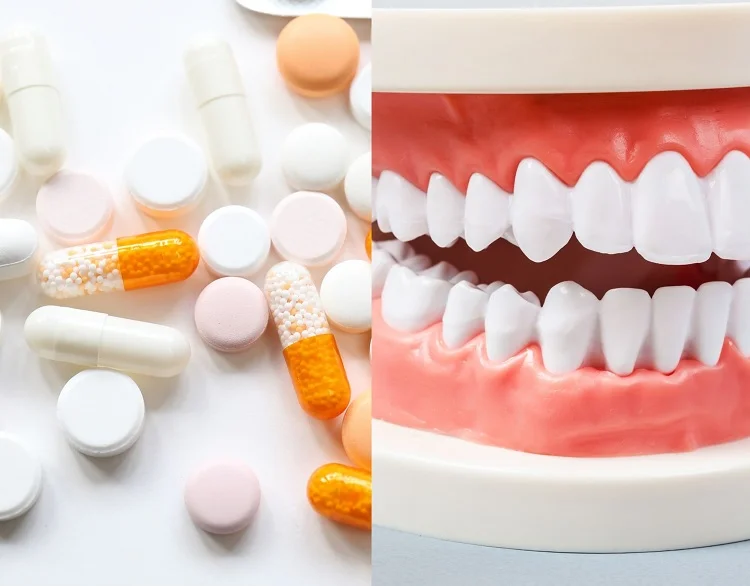Last Updated on: 13th December 2025, 08:20 am
Nifedipine and dental health are closely related, as this medication—commonly used to treat high blood pressure—can cause side effects such as gingival hyperplasia (gum overgrowth) and dry mouth. These changes increase the risk of cavities, gum infections, and overall oral discomfort. To reduce these effects, maintain excellent oral hygiene, consult your dentist regularly, and speak with your doctor about adjusting the dosage or medication if needed.
How Are Nifedipine and Dental Health Connected?
Treatment to control high blood pressure (hypertension) typically includes a prescription for nifedipine, a medication that relaxes the blood vessels and makes it easier for the heart to pump blood, avoiding complex health consequences.
While nifedipine helps control blood pressure, during treatment, it generates oral side effects (secondary) that must be addressed in a timely manner.
What is the connection of nifedipine and dental health? What effects does this medication have on oral health? How can this impact of treatment for hypertension be mitigated?
Hypertension treatment, of course, must not be suspended; but when this condition is not controlled, dry mouth occurs and the probability of cavities increases due to the accumulation of bacterial plaque. Serious deterioration of oral health ensues along with a decline in overall well-being.
The recommended route is appropriate professional attention to ensure comprehensive health.
What is Nifedipine?
Nifedipine belongs to a group of medications known as calcium channel blockers.It is prescribed to control high blood pressure (hypertension), angina, premature labor, and Raynaud’s syndrome (cold, numb feeling in parts of the body).
Nifedipine relaxes blood vessels and lowers blood pressure, making it easier for the heart to pump blood. Less effort on the part of the heart prevents cardiac problems, strokes, damage to the blood vessels or kidneys, among other conditions.
What Effects does Nifedipine have on Dental Health?
Gingival enlargement and dry mouth (hyposalivation) are recurring symptoms in people receiving treatment for blood pressure control with the calcium channel blocker drug, nifedipine.
Given the circumstances, certain techniques or practices can reduce the impact of the drug’s side effects.
Taking nifedipine, in combination with other factors, entails a greater predisposition to gingival enlargement. These predisposing factors are:
• Accumulation of bacterial plaque (also caused by the absence of saliva).
• Drug dosage.
• Age of the person taking the medication.
• Poor oral hygiene
Why does Gingival Hyperplasia Occur?
It is a consequence of cell growth that facilitates the creation of pockets where bacteria are harbored and cannot be reached with regular brushing or flossing. This, in turn, has an effect on oral hygiene practices and favors the appearance of cavities, oral infections, or periodontal disease.
Gingival hyperplasia causes pain when chewing, inconvenience when speaking, bleeding gums, bite problems, and alterations in the aesthetic appearance of the teeth and smile.
The teeth appear smaller, and although the hyperplasia affects the entire mouth, the lesion occurs more prominently in the front teeth and the upper jaw.
Gingival hyperplasia usually disappears when a change in dosage or nifedipine treatment is discontinued. In some cases, surgical intervention is necessary.
How can the Effects of Nifedipine on Dental Health be Reduced?
This health condition can be prevented and its impact reduced with good oral hygiene in combination with proper medication dosage.
It is important to consult with the treating physician regarding the perceived effects,making it easier to modify the treatment protocol with nifedipine or change to another drug that yields the same therapeutic results.
Another prevention alternative is periodontal treatment. In some cases, anti-inflammatory drugs are also prescribed.
A relevant prevention practice is to encourage increased humidity in the mouth. The constant consumption of water and the intake of some foods can help in this regard.
Foods that help increase saliva are hard cheeses (Gouda / Parmesan); fruits like lemon, lime, blueberries, papaya, and pineapple; and spices like cayenne pepper, ginger, cardamom, and fennel. The consumption of butter and milkshakes is also recommended.
To facilitate the production of saliva, it is recommended to avoid the consumption of alcohol, energy drinks, and coffee.
If a taste disturbance occurs, the doctor guiding the treatment should be consulted to assess the situation and make the required adjustments.
Why Is It Important to Act in Time When Using Nifedipine?
If you are being treated for blood pressure (hypertension) with nifedipine— or for other pathologies for which this drug is prescribed— it is important to pay attention to changes in your oral health, such as the sensation of a dry mouth or an alteration in the appearance of the gums or teeth.
Consulting the dentist regularly will allow the practitioner to detect symptoms and be proactive with the appropriate therapeutic option.
Acting in time will reduce the effects of the treatment for hypertension on oral health, improving quality of life.
Frequently Asked Questions
What is nifedipine?
Nifedipine belongs to a group of medications known as calcium channel blockers.It is prescribed to control high blood pressure (hypertension), angina, premature labor, and Raynaud’s syndrome (cold, numb feeling in parts of the body).
How does nifedipine affect your teeth?
Gingival enlargement and dry mouth (hyposalivation) are recurring symptoms in people receiving treatment for blood pressure control with the calcium channel blocker drug, nifedipine.
Can nifedipine cause gingivitis?
Yes, it produces gingival hyperplasia. It is a consequence of cell growth that facilitates the creation of pockets where bacteria are harbored and cannot be reached with regular brushing or flossing. This, in turn, has an effect on oral hygiene practices and favors the appearance of cavities, oral infections, or periodontal disease as gingivitis.
Do Calcium Channel Blockers Affect Teeth?
Several calcium channel blockers can lead to gingival hyperplasia, a condition characterized by excessive gum growth around the teeth. Additionally, they might exacerbate symptoms of gastroesophageal reflux disease (GERD) or heartburn.
What should be done if oral problems occur during treatment with nifedipine?
If oral problems such as dry mouth or changes in the appearance of the gums or teeth are experienced during treatment with nifedipine, it is crucial to consult a dentist regularly. This will allow any symptoms to be detected and treated proactively, thus improving the patient’s oral health and quality of life.
Voice and Search (Q&A)
Why does nifedipine cause gum overgrowth?
Nifedipine can lead to gum overgrowth, or gingival hyperplasia, due to its effect on cellular activity in the gums, especially when combined with poor oral hygiene or plaque buildup.
Can nifedipine cause dry mouth?
Yes, nifedipine may reduce saliva production, causing dry mouth. This can increase the risk of cavities and gum disease if not managed properly.
How can I prevent dental issues while taking nifedipine?
To prevent dental problems, maintain good oral hygiene, stay hydrated, visit your dentist regularly, and talk to your doctor about adjusting the dose if symptoms persist.
Share:
References
1. Castro M, Fabres M, Salinas A (June 2020) Nifedipine and its consequences in dentistry / https://bit.ly/3NOpFuW
2. Diaz Antonio, Tovar Luis, Fonseca Ricaurte (January 2009) Gingival enlargement induced by nifedipine. Case report / https://www.researchgate.net/publication/237392570_Agrandamiento_gingival_inducido_por_nifedipinaReporte_de_un_caso
3. Diaz Nancy, Vázquez Miguel (August 2009) oral manifestations in patients Oral manifestations in hypertensive patients under antihypertensive treatment hypertensive patients under antihypertensive treatment / https://www.medigraphic.com/pdfs/imi/imi-2009/imi092i.pdf
4. MedlinePlus (October 15, 2017) Nifedipine / https://medlineplus.gov/spanish/druginfo/meds/a684028-es.html
-
Nayibe Cubillos M. [Author]
Pharmaceutical Chemestry |Pharmaceutical Process Management | Pharmaceutical Care | Pharmaceutical Services Audit | Pharmaceutical Services Process Consulting | Content Project Manager | SEO Knowledge | Content Writer | Leadership | Scrum Master
View all posts
A healthcare writer with a solid background in pharmaceutical chemistry and a thorough understanding of Colombian regulatory processes and comprehensive sector management, she has significant experience coordinating and leading multidisciplina...



















